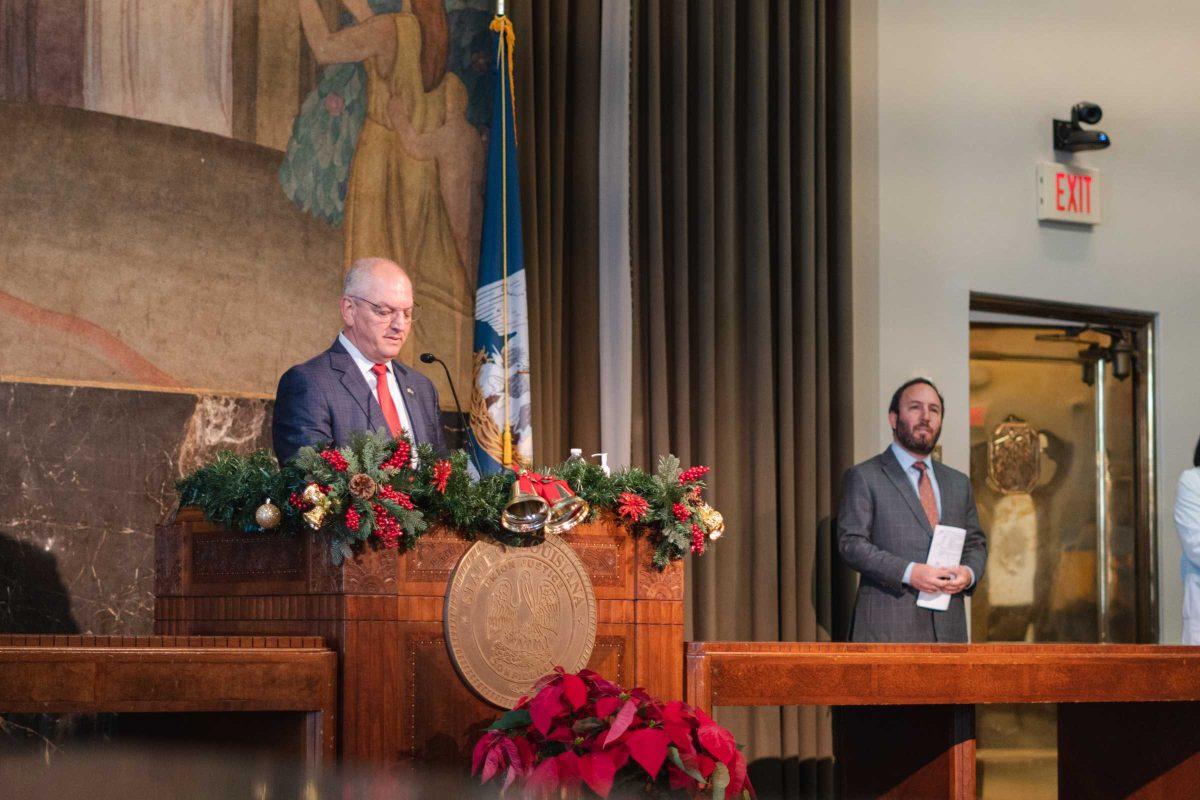Louisiana Gov. John Bel Edwards unveiled his executive budget on Monday for the upcoming legislative session in March. Here’s a breakdown of how Edwards’ administration wants to see the state’s excess funds spent:
-
$1.1 billion for critical infrastructure — including a $500-million Mississippi River bridge in Baton Rouge — statewide improvements to water and sewage systems that would also cost about $500 million and $100 million for the I-10 bridge in Lake Charles.
-
$1,500 pay increase for K-12 teachers, $750 pay increase for support staff and $43 million for early childhood education.
-
$31 million for faculty pay increases at colleges and universities and $97 million for further higher education funding, including money for more Louisiana universities to open Title IX offices.
-
$108 million for deferred maintenance on public buildings.
-
$550 million in federal funds from the Biden Administration’s American Rescue Plan to replenish the state’s Unemployment Insurance Trust Fund, which was depleted during the pandemic. This investment will get the fund back to its statutory requirement of $750 million, avoiding triggering a tax on businesses, Edwards said.
“For decades, Louisiana has been on the top of too many bad lists and the bottom of too many bad lists,” Edwards said at a press conference. “How do we get off the bottom of those lists?”
His answer: education.
“Education cures a lot of ills,” Edwards said. “I think we have a once in a generation and maybe once in a lifetime opportunity in some respects, to move our state forward.”
Commissioner of Administration, Jay Dardenne, will present the plan to the Joint Legislative Committee on the budget on Jan. 25, as required by the state constitution.
While the governor is required by law to present a budget, the Republican-controlled legislature ultimately gets to decide what the final bill looks like.
Edwards emphasized that he only wanted to use these one-time funds to go to one-time expenditures.
“The first budget that I inherited, the last six months of that budget year, more than $800 million in one time money plugin for recurring expenditures,” Edwards said. “We didn’t and we don’t want to create those types of problems again.”
Edwards said that he believes the budget is one that the legislature can easily support. Earlier this month, Senate President, Page Cortez, indicated support for using some of the $1.6 billion excess on the state’s infrastructure problems, including deferred maintenance on public buildings.
The state had a $1 billion surplus in the last fiscal year. After constitutional requirements are met, there will be about $400 million to spend at the legislature’s discretion.
At the time the surplus was announced, Dardenne indicated that about $133 million would go to deferred maintenance, but due to higher-than-expected transportation needs, he is calling for slightly less.
LSU has over $630 million in deferred maintnence needs. Some of the largest projects include repairs to the Renewable Natural Resources building’s foundation, air conditioning fixes for Pleasant Hall and $2.7 million for the LSU Library.
Cortez also told the USA Today Network that he supports using these one-time funds for infrastructure projects.
“Traditionally we haven’t had money dedicated annually to infrastructure projects, so when we get a surplus I consider that a priority for a one-time investment that will continue to pay dividends for decades,” Cortez said.
All in all, Edwards seemed optimistic about the budget.
“I am extremely bullish on the future of Louisiana,” Edwards said. “I think the budget proposal that we just unveiled supports being bullish on the future of Louisiana.”






